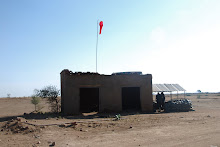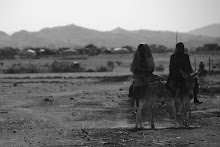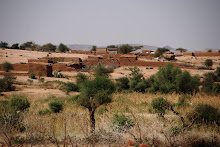Media reports this week cite growing concern over ‘denial of humanitarian access’ in Darfur. Although such denial certainly exists, many of the actors being denied – in the form of travel bans, visa refusals, car-jacking, etc - are not strict ‘humanitarians,’ but a loose community of NGO’s whose right to intervene is debatable.
International law guarantees the protection of humanitarian space and actors – defined as neutral and impartial – in order to meet pressing needs of a population in wartime. The International Committee of the Red Cross as well as a few other agencies, such as MSF (Medecines Sans Frontiers) who define themselves by these focused principles, continue to fulfill this role.
But because human rights and civilian protection norms have expanded, the NGO community now includes organizations focused on education, counseling, women’s empowerment and other services. Which means, more and more, NGO’s are claiming the right of access, but not the responsibility. Their staff are not specialists in humanitarian law, the organizations participate in advocacy, provide statements to the media, or are linked with public figures. Yet, they still cry ‘denial of humanitarian access’ when their activities are blocked.
Humanitarian is a word used to self-describe - it’s not a laissez-passe to the destination of choice. NGO’s are guests in the countries in which they operate and can, legally, be expelled. Forfeiting neutrality means forfeiting the right to be present.
This conundrum is a stark reality in Darfur where an NGO setting up a medical clinic must face the decision to treat rape cases silently day-after-day, or to speak out against the violence and risk being expelled. Any NGO that chooses to be vocal knows they are making it more difficult for other organizations to establish care-facilities.
This problem has been exacerbated by the shrinking international state presence in Africa since the cold war. Now, when major events happen, the media and the Western world turn to the NGO’s on the ground for information and guidance. But an NGO that has made political statements in Uganda, cannot claim humanitarian status in Darfur.
So what does this mean for Darfuris? Confusion, duplication, obstruction, and lack of trust. A woman reporting a rape is never quite sure if it will be confidential – to whom or where the report will go. NGO’s repeat each others’ work because anyone conducting a nutrition or education assessment is reluctant to make it public. This has entrenched a culture of secrecy, competition, and non-transparency, as everyone tries to hide under the umbrella of humanitarian law.
Some organizations, such as Human rights Watch, have stepped boldly out into new territory – reporting and advocating very effectively but not maintaining a presence on the ground. The two extreme types of organizations (humanitarian and watch-dog) operate effectively under current international law, but the range in between is lost in the blurring lines.
We need a redefinition of terms and a rethinking of norms of access to allow different agencies to fulfill different roles. And we should start by clarifying the terms. Celebrities are not humanitarians, they are activists. OCHA – The Office for the Coordination of Humanitarian Affaires - is also the Office for the Coordination of NGO activity.
The government of a host country can and should be condemned for expelling organizations who report on rape and other topics – as a violation of free speech, or failure to protect its people – but is this really denial of humanitarian access?
Friday, October 24, 2008
Subscribe to:
Post Comments (Atom)













































2 comments:
some time ago I read a report on Darfur crisis and it was disconcerting to see how they are violating the human rights of many people in the region and they can't buy viagra
Post a Comment